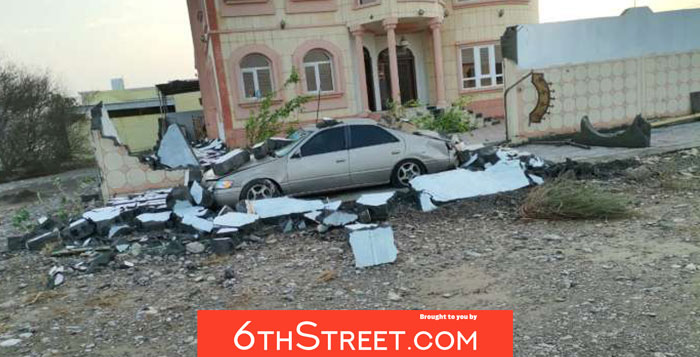

Muscat: Citizens in North Batinah have begun taking stock of the impact caused by the fierce wind and rain that led to extensive damage to their homes and killed many of their livestock.
A tropical depression last Tuesday and Wednesday saw many of the wilayats of the governorate face the brunt of the weather, with 70-year-old Saeed bin Saif Al Saeedi admitting to being very terrified during the rainstorm.
“I don’t know where to start – I am still unable to believe what has happened,” said the native of Khaboura. “That night, all I wanted to do was protect my family, so that we would not get hit by flying objects: the sounds of lightning and thunder were also truly terrifying. I have not experienced a storm like that for the last 70 years.”
Saeed lost more than half his home in the storm, which he feels should be renamed a cyclone, due to the severity of the conditions. The kitchen, storeroom, and toilet were completely destroyed, while a part of the roof also blew away. Hearing the sound of hailstones hitting what was left of his ceiling, the doors, and windows, he and his family prayed they would survive the night.
“I could hear the sounds made when other debris fell to the ground: it felt like there was an earthquake going on,” he admitted. “The electricity went out as well, so my family and I got together in the dark, after I blocked the doors to stop the water from coming in.”
Although the storm only lasted an hour, to Saeed, it seemed like a lot longer. Several trees were uprooted by the storm, many of them falling over livestock: Saeed lost about 45 of his own sheep, an important source of his livelihood, as well as above 30 date palms, as well as many banana and mango trees, whose fruit he sold to fruit and vegetable vendors.
“My own property, which is in the backyard of my home, had been completely blown off, while my vehicle has also suffered extensive damage,” he said. “Many camels have had to endure quite serious injuries, owing to the debris that hit them.”
Apart from debris that included pieces of stone and iron torn off from fittings, and portions of fences used to contain livestock, a number of electricity poles also fell over because of the impact of the storm, leaving many in the region without power.
“Our losses are valued at more than OMR7,000,” Saeed admitted. “I appeal for government support during unfortunate times, so that we can overcome these damages. We urgently need for others to stand by us at this time, particularly since there is a ban on shops being open, which means we cannot buy the necessities required to repair the heavy damage of the storms.
“We had learned from media sources that an air depression was expected at night, but we were unaware of the strength of the wind,” he said.
“We wish this would have been included in the information we received, so that we could have taken the necessary precautions, and prevented such large-scale losses from happening.”
Another citizen, Ahmed bin Khamis Al Ghafri, who lives in Wilayat Suwaiq, also described the damage done to his property, calling the night of the storm ‘one of the toughest nights’ he has ever experienced, owing to the torrential rain, strong winds, and continuous hail. Many of the agricultural crops he grows to support his family have been destroyed, including the bananas and date palm trees which he harvests, as well as the fodder used to feed his animals.
“The storm blew out the main door of my home, as well as the roof of my vehicle shed,” he said. “The sounds of the wind, the thunder, and the sight of the lightning terrified my family.”
Ayman Al Shidi, from Saham, added, “The roof of my shed fell on my vehicle, causing damage. This is aside from the great damage caused to the property in my house. A number of fixtures were also torn off and landed in my yard.”
More than 100 electricity poles have been damaged by the storm, and technical teams are working to restore connectivity to areas affected in North Batinah, said Ibrahim bin Ali Al Farsi, the senior director of subscriber services as Majan Electricity Company.
“The electric substations have returned to service, while the main feeders have also been fixed in Saham and Khabourah,” he added. “This also includes the low-pressure feeders and faults in people’s properties.”
The Ministry of Defence has also supplied generators so that power can be restored to homes and offices while the repairs continue. Engineers and other personnel from the Sultan’s Armed Forces are also involved in fixing the power supply, clearing the roads of debris, and guiding water tankers deployed to remove floodwaters. Relief supplies have also begun being distributed to people affected, in the form of food parcels and household items.